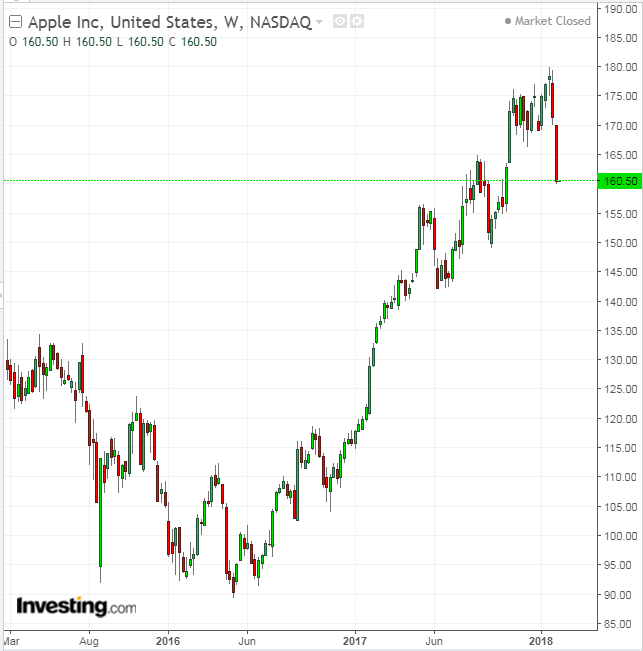The outlook on Apple (NASDAQ:AAPL) stock is rarely downgraded by analysts. Last week was an exception, however, after the tech titan's Q1 2018 report on Thursday, February 1, when many forecasters saw the formidable company struggling to meet Wall Street’s expectations for sales growth.
For some analysts, Apple’s forecast for lower-than-expected revenue for the second quarter along with lower iPhone sales during the last holiday season meant that the “super cycle” of its growth is winding down fast, signaling they should pare down their projections. This dismal view didn’t have a positive impact on Apple’s share price.

As of this writing, the stock is trading at $160.50, down 11% from its 52-week high. What’s making investors so nervous about this $816-billion company which for years produced market-crushing returns?
While announcing its first-quarter earnings on Feb.1, Apple also provided a forecast for its March quarter that missed Wall Street’s expectations by several billion dollars. But that wasn’t the biggest negative surprise.
For several weeks now the market has been anticipating some slowdown in sales, following the news that Apple was cutting shipments from its suppliers because consumers weren’t too keen on buying new iPhones. What disappointed analysts more was the sales report for iPhones during the key 2017 holiday buying season. During this period, iPhone sales topped 77 million units, 1% below the year-earlier total, and under the 80 million that Wall Street was expecting.
Yet as disappointing as all that may look to some analysts, I think Apple's shares are undervalued, and this pullback provides a good opportunity for long-term investors to buy Apple. Here are my top reasons supporting this bullish call on the stock:
1. Capital Return Plan
For long-term investors, whose objective is to earn a decent return through dividends and capital appreciation, the timing couldn't be better than this to own Apple stock. The company is planning to further increase its capital return plan which is already the biggest in corporate history. Apple’s head of finance, Luca Maestriby, told analysts last week that the company plans to hold an equal amount of cash and debt, suggesting more dividends and share buybacks are on the way. Apple has been in the process of a $210-billion share buyback program, of which $176 billion has already been completed.
Apple’s cash hoard jumped to $285 billion, adding to the pile of offshore money that will be taxed under new U.S. legislation. The company is bringing hundreds of billions of dollars back to the U.S. and plans to pay $38 billion in taxes. When Apple announces details of its capital-return plan, most likely in May, the company might boost its share buybacks to as much as $300 billion, according to an estimate by Jim Suva of Citigroup). That would mean buying back more than a third of the company over several years.
I’m a big fan of companies which buy back their shares. With a share buyback, the value of your Apple holdings will improve, as there will be fewer shares outstanding and a higher proportion of earnings being distributed among a smaller number of shareholders.
Don’t be disappointed by Apple’s current, tiny 1.56% dividend yield. If you hold on to this stock, your actual return will be much bigger.
2. Revenue Diversification
Apple isn’t just about iPhones. The latest numbers show that the company is successfully diversifying its revenue base. Apple's services division, which includes Apple Music, movie rentals and app downloads, produced $30 billion in sales last year, bringing it closer to achieving the segment's $50 billion target by 2020. For the first quarter, Apple reported sales of $8.5 billion for its services business, an 18% jump from the same period a year ago.
If Apple continues to garner more sales from its other divisions, by convincing consumers to buy its products as a way to seamlessly integrate its solutions, we would see less dependence on the iPhone business and more diversification into additional growth areas.
The bottom line: Slowing iPhone sales might keep Apple shares depressed in the short-run, but I think investors will be better off remaining invested amid rising share buybacks and potentially higher dividends.
